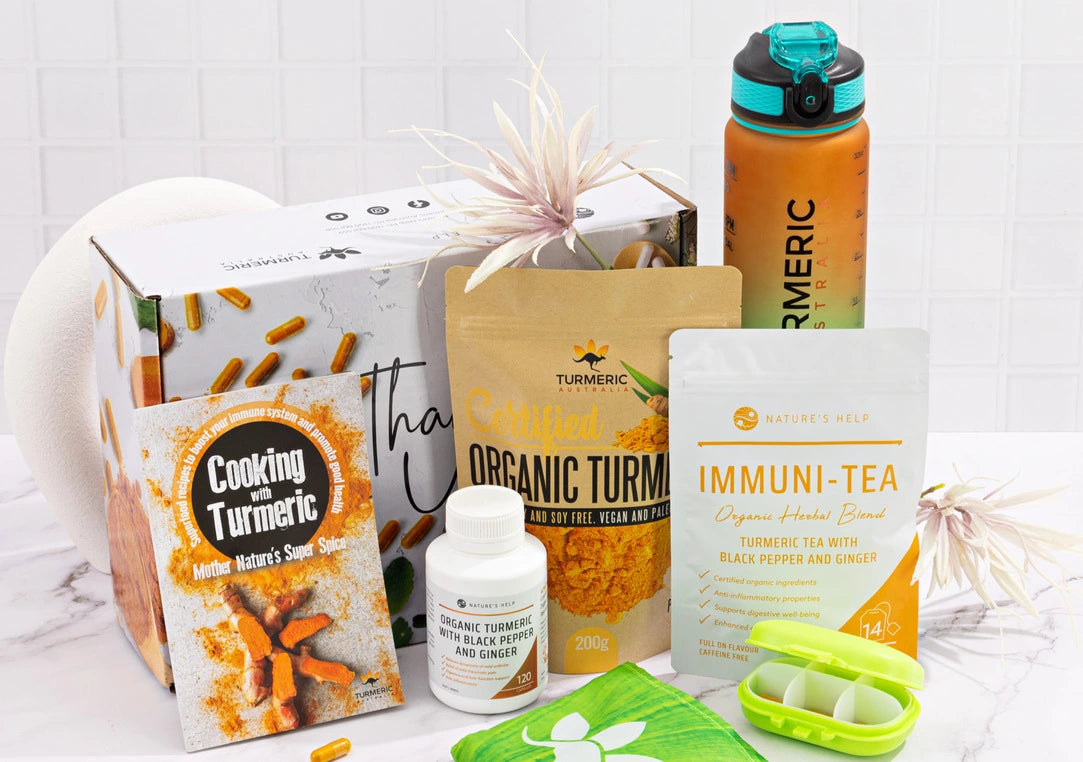Young Onset Dementia and the Power of Turmeric
When we think of dementia, we often picture it as something that happens later in life. But for more than 28,000 Australians under the age of 65, dementia is already a daily reality. Known as young-onset dementia, this condition is rising—and it’s more complex and life-altering than most people realise.
As science continues to explore the causes and progression of cognitive decline, one powerful natural ingredient is standing out for its potential brain-protective properties: turmeric.

Understanding Young-Onset Dementia
Dementia is often thought of as a condition that only affects older people—but a growing number of Australians are facing a very different reality. Young-onset dementia, also known as early-onset dementia, is diagnosed in individuals under the age of 65. For these individuals—some in their 40s or even late 30s—the diagnosis is not just a medical condition; it’s a complete disruption to daily life, relationships, careers, and future plans.
Unlike typical late-onset dementia, the early symptoms of young-onset dementia aren’t always memory loss. They often show up as:
- Personality and mood changes
- Trouble with language and communication
- Difficulty with visual processing or spatial awareness
- Challenges in decision-making or managing tasks
- Emotional instability or unusual behaviour
These signs can easily be misattributed to stress, depression, or burnout, causing a delay in diagnosis and support.
While there is currently no cure, research increasingly supports the idea that lifestyle choices—particularly those that reduce inflammation and oxidative stress—play a powerful role in preserving cognitive health and potentially slowing decline.
The Science: Turmeric’s Role in Brain Health
Turmeric, a golden spice long used in traditional medicine, is gaining scientific attention for its brain-boosting properties. The key compound? Curcumin.
A study published in 2010 found that curcumin exhibits potent anti-inflammatory and antioxidant effects that can help protect the brain from cellular damage. It may help reduce the accumulation of beta-amyloid plaques and tau protein tangles—two of the hallmarks of Alzheimer’s disease.
Inflammation and oxidative stress are known contributors to both early and late-onset dementia. By targeting these processes naturally, curcumin offers an exciting path forward in dementia prevention and cognitive support.
Learn How to Protect Your Brain, Boost Focus and Memory, and Stay Sharp Naturally
Maintaining long-term brain health doesn’t require drastic change—it’s about making consistent, intentional choices that support your mind on every level. From science-backed nutrients to everyday lifestyle habits, you can take real steps toward protecting your cognitive function and improving your focus, memory, and resilience as you age.
Here’s how to get started:
1. Nourish Your Brain with Smart Supplementation
The right combination of high-quality nutrients can make a measurable difference in brain clarity, energy, and ageing. Our Brain Health Support Collection is designed to help with just that:
Curcumin (from Turmeric Root Extract)
- Reduces inflammation, protecting against cognitive decline.
- Prevents oxidative damage linked to Alzheimer's and dementia.
- Helps clear beta-amyloid plaques, improving memory and focus.
Magnesium
- Regulates neurotransmitters, crucial for mood, memory, and clarity.
- Supports deep sleep, essential for brain detoxification and memory consolidation.
- Protects against cognitive impairment caused by stress.
Vitamin D3
- Enhances mood, memory, and cognitive function.
- Promotes healthy nerve function and brain cell communication.
- Linked to reduced risk of cognitive decline.
Vitamin K2
- Supports brain health by maintaining optimal blood flow.
- Associated with better cognitive performance and dementia prevention.
Quercetin
- Protects brain cells from inflammation and oxidative stress.
- Enhances memory, cognition, and learning ability.
Vitamin C
- Reduces oxidative stress, supporting brain function and clarity.
- Helps maintain neurotransmitter balance.
Vitamin D
- Boosts cognitive function, supports mood, and protects brain health.
Vitamin A
- Essential for healthy brain function, neuron growth, and inflammation reduction.
Zinc
- Supports memory, cognitive performance, and brain longevity.
- Protects against inflammation and brain cell damage.

2. Choose Brain-Fuelled Nutrition
What you eat directly impacts how your brain performs. Stick with:
- Leafy greens, berries, fatty fish, nuts, and turmeric
- Foods rich in antioxidants and omega-3s
- Minimally processed, whole food meals that reduce inflammation
3. Prioritise Deep, Restorative Sleep
Your brain clears toxins and consolidates memory while you sleep. Make sleep sacred by:
- Going to bed at the same time each night
- Avoiding screens 1 hour before bed
- Using magnesium-rich supplements like Ultra Magnesium for relaxation and deep rest
4. Stay Physically and Mentally Active
- Aim for at least 30 minutes of physical movement a day
- Incorporate strength training 2–3 times a week
- Keep your mind sharp by reading, learning, and solving puzzles regularly
5. Lower Your Stress Load
Stress is one of the biggest contributors to memory problems and cognitive decline. Support your brain by:
- Practicing mindfulness or meditation daily
- Taking regular breaks throughout your workday
- Spending more time in nature and less time in high-stress environments
By integrating these strategies and nourishing your brain with the right tools, you can take real, meaningful steps to stay sharp, energised, and focused—naturally.
Final Thoughts: Prevention Starts Now
The research on turmeric and dementia is promising, and paired with other nutrients like magnesium, Vitamin D3, and Quercetin, you have powerful tools at your fingertips.
Whether you’re looking to support a loved one or protect your own long-term cognitive health, the Brain Health Support Collection from Turmeric Australia is designed with real people and real prevention in mind.

